
How a British man ended up on the FBI's 'Most Wanted' list for allegedly helping North Korea evade sanctions
His first had been the dark and cramped detention facilities at Riyadh Airport where he had been arrested on an Interpol Red Notice before getting his morning coffee. His new cell was packed with even more people, and now his wrists and ankles were in shackles.
"I saw that the situation could be quite volatile... my strategy was just sit down, look at the floor, and don't make eye contact with anyone," he told Sky News.
There had been a time when he thought his visit to Pyongyang in North Korea in April 2019 was just a quirky tourist trip, something he would be able to tell a story about. Now, almost three years later, the 30-year-old was in a foreign prison facing extradition to the US.
The US Department of Justice suspected Emms and a Spanish co-defendant had organised a cryptocurrency conference in Pyongyang at which they had advised North Korea's government about using the technology to route around a banking embargo imposed because of its "hostile nuclear ambitions".
At the time of Emms' arrest a sealed indictment charged the pair with conspiring with an American crypto developer called Virgil Griffith to violate the International Emergency Economic Powers Act, an offence which carries a fine of up to $1m and a maximum sentence of 20 years.
Griffith himself had already pleaded guilty to his charge and had been sentenced to more than five years in prison.
In an exclusive interview with Sky News detailing his experiences in North Korea and in Saudi Arabia, Emms, now on bail in Jeddah, says he is innocent and that he had briefed the British security services about his trip without causing them any alarm.
He is asking for the US to allow him to return to the United Kingdom to face extradition proceedings from there.
"I really just want to come back home and deal with this through the British court system, which I don't think is a huge thing to ask, even of the Americans," he said.
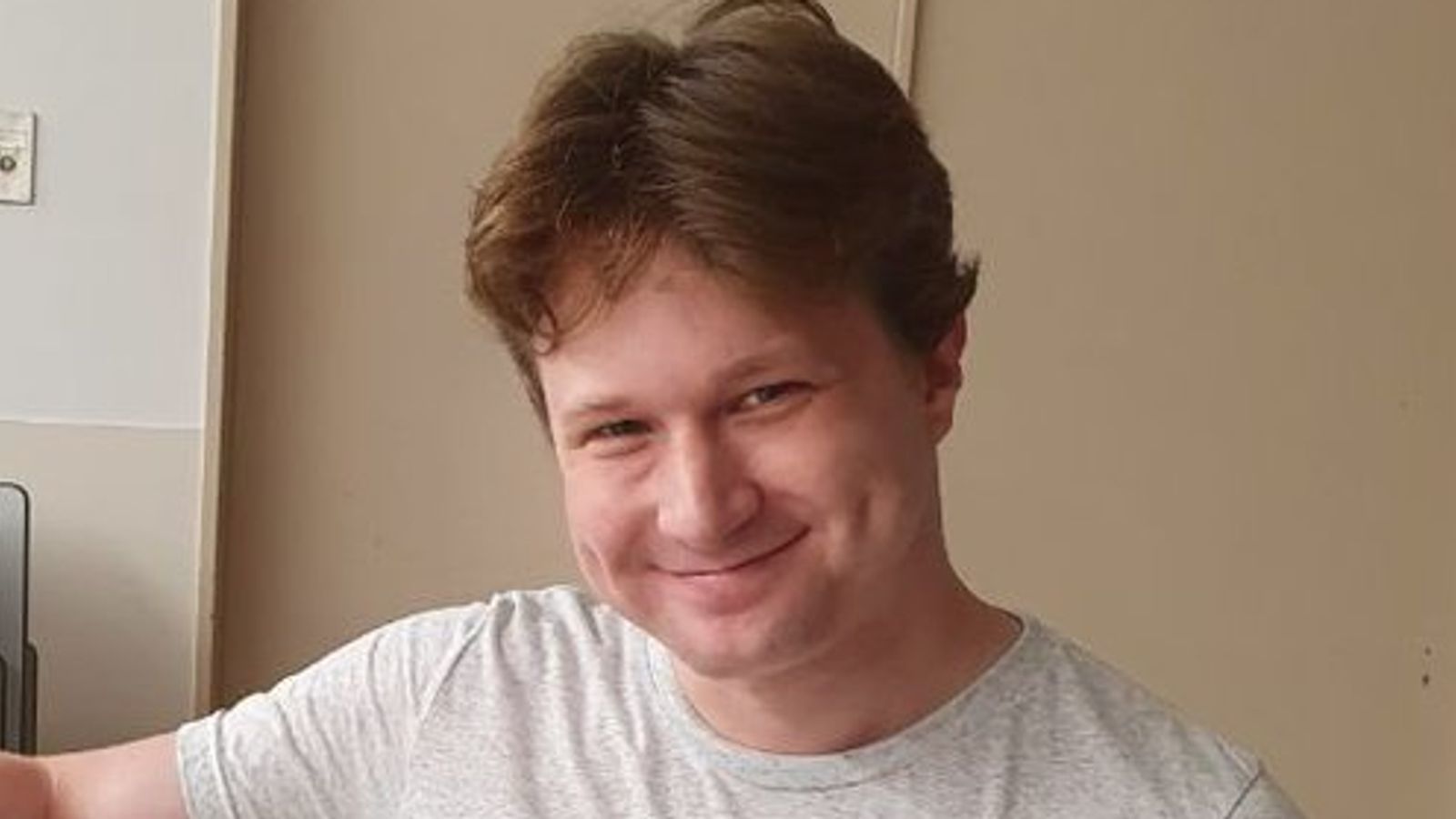 Virgil Griffith pleaded guilty and was sentenced to more than five years
Virgil Griffith pleaded guilty and was sentenced to more than five yearsGetting to Pyongyang
Back in 2018, Emms was a regular speaker on the cryptocurrency conference circuit. He had been the head of business development at bitcoin.com and had started his own business that involved providing legal and compliance services for the then latest crypto craze: initial coin offerings.
He told Sky News that business was "a tremendous failure in many ways" because "even now, but especially back then, it was very much a wild west".
In those days "there was a blockchain conference of some description somewhere in the world at least three times a week", he said, but it was still unusual when the man who became his co-defendant, Alejandro Cao de Benos, approached him to speak at one in Pyongyang.
"My initial reaction was, 'Look, is this legal? Am I going to be breaking any laws by doing it?', so I did my due diligence, I checked the British government website on travelling to North Korea. I looked up the UN resolutions on North Korea. I really did my research to check whether if I, as a British citizen, would be breaking any laws, and it didn't appear that I would be breaking any laws," he said.
Cao de Benos comes from an aristocratic family in Spain and has been a committed public supporter of the Democratic People's Republic of Korea for several decades, running the international Korean Friendship Association which celebrates the country's Supreme Leader Kim Jong Un and offers tours to the country.
"I don't really know the gentleman," said Emms, explaining they had spoken for the conference but had not kept in touch. "All I can comment on is what we all see online on his various different channels, at which point, you know, I think that speaks for itself."
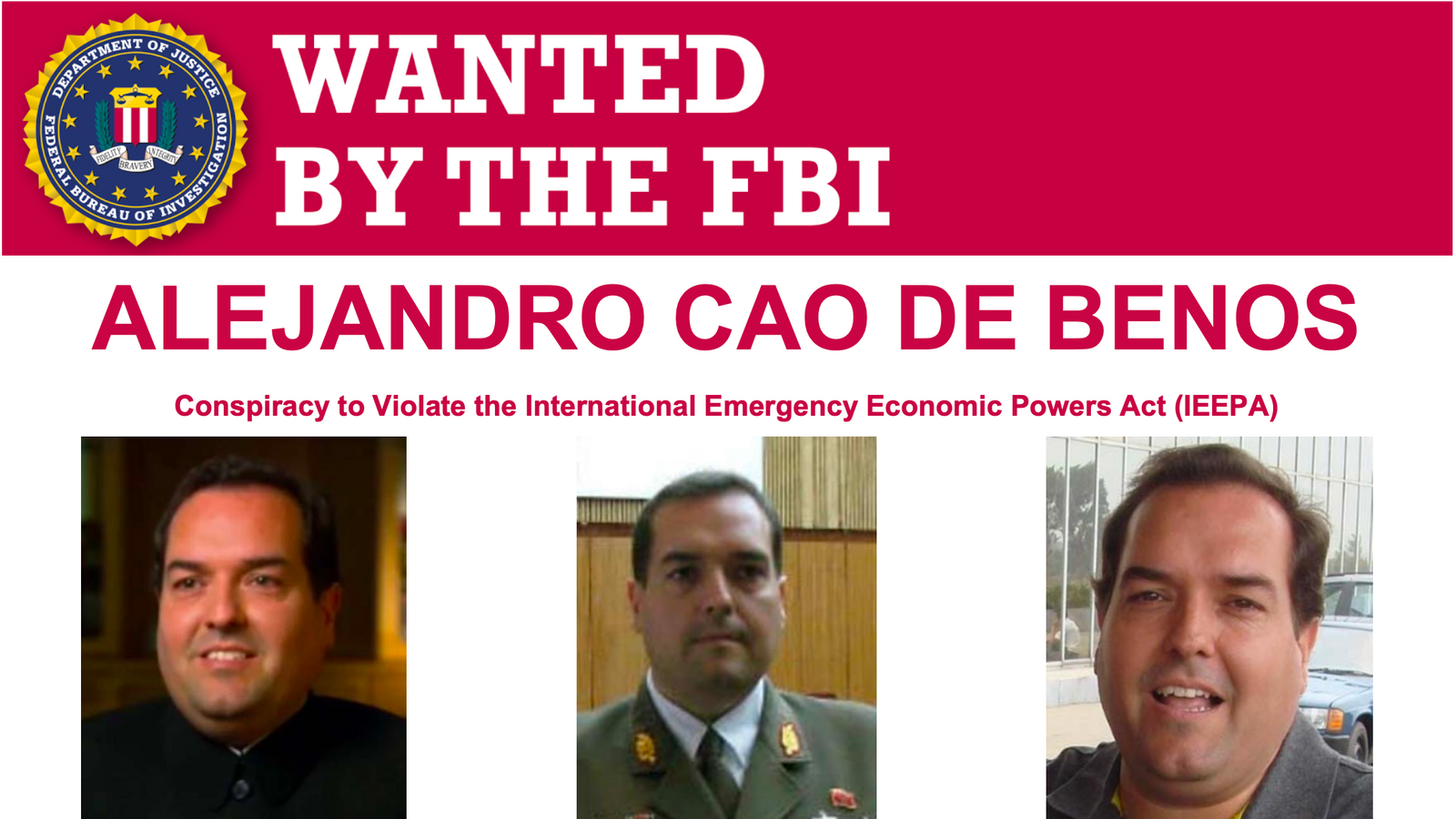
Crackdown after pornography discovered on phone
North Korea was "pretty much exactly what you see in any kind of documentary that's ever been made by any Western journalists", said Emms.
They arrived and their passports were thoroughly checked before they were released to go through baggage control and "what appears to be normal customs that you'd have flying into the UK for example, but it's not quite the same" because the officials started to go through all of the images on the visitors' electronic devices.
"This is when it initially got quite scary," said Emms. "One of the gentlemen who was attending the conference had decided for some reason to bring in a film of a pornographic nature.
"That was discovered by the authorities. So instantly, upon that happening, everyone's passport was confiscated. So that's your first impression. Again, you can imagine what that feels like. It's not a nice feeling."
Without their documents they were taken to their hotel "which is essentially a compound, there's no getting out [and] there's no getting in unless you're accredited to be in this hotel, which is pretty much empty."
They were taken on the typical tourist excursions, visiting sites around Pyongyang, and went on a day trip to the demilitarised zone from where they could look into the south.
"And then, towards the back end [of the trip] there was this quote-unquote 'conference'," said Emms.
"A lot of other people who attended have spoken about this now. To describe it as a conference as we know it in a conventional sense would be very difficult.
"Essentially, we were given materials that we were told were pre-approved by the North Korean government, which were basically pieces of paper that had been copied and pasted from Google that had very basic information on blockchain.
"And we're starting to get hints from the local guides, if you like, 'this better go well', and we're constantly told 'this better go well, this is a very serious thing that's happened with this video that's been discovered', so everyone's very much on edge."
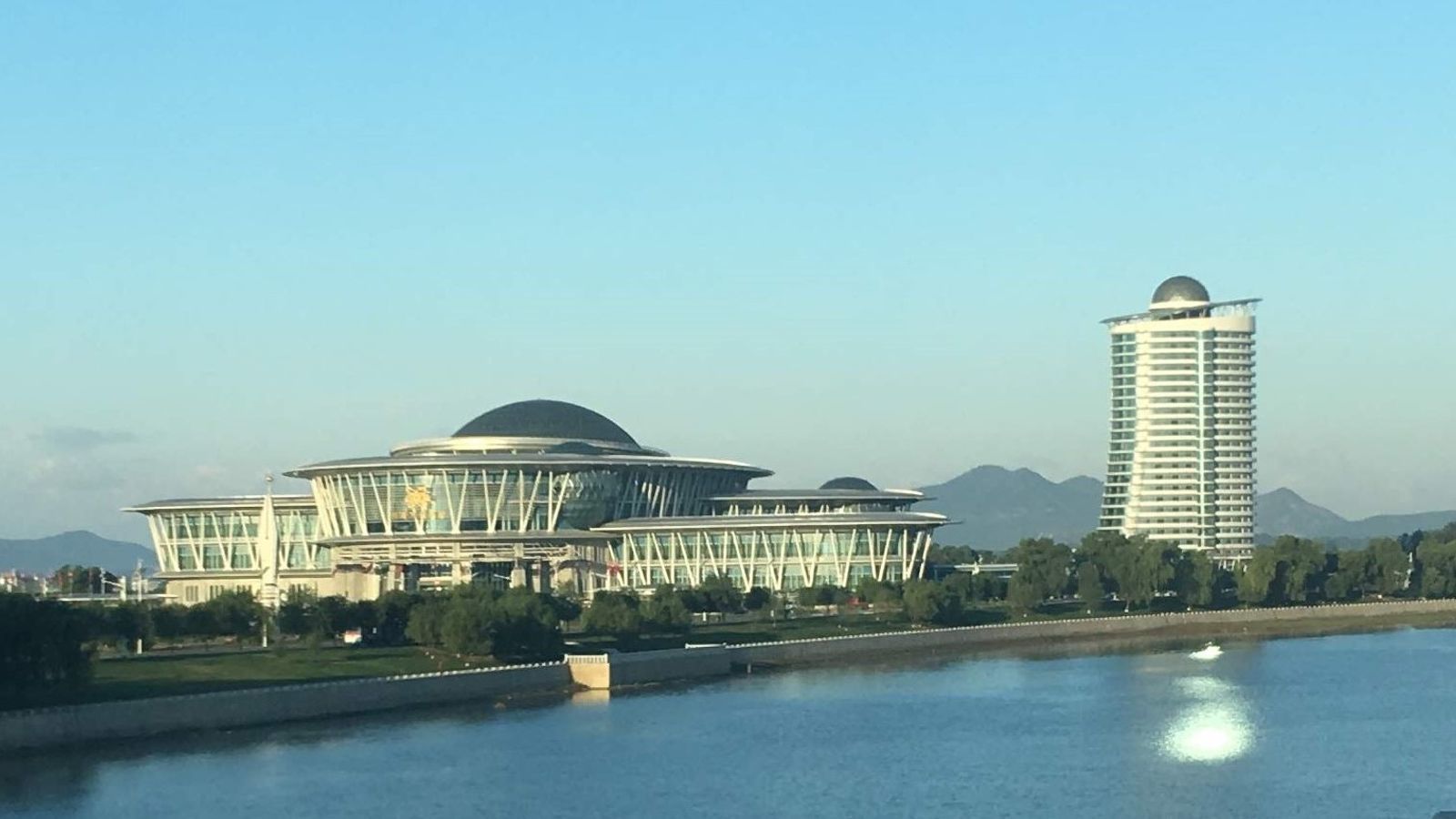 Pyongyang's Sci-Tech Complex was built in 2015.
Pyongyang's Sci-Tech Complex was built in 2015. 'We were told that you need to perform'
According to Emms the conference itself was being held at a big facility "but there was no one in it apart from us [the speakers] and these people attending, I'd say no more than 20 people".
"What we ended up doing in this conference is, you know, reading the sheets of information, and obviously ad libbing a bit, but not trying to break any laws or anything.
"It was so boring that most of the participants were falling asleep. I actually fell asleep myself at one point."
According to the FBI, Emms opened the conference by stating: "I'm sure a lot of people in this room [who] work within the banking system, will understand how predominantly the United States controls the way in which money moves around the world and this can be very, very unfair."
He talked about how cryptocurrency made it "possible to transfer money across any country in the world regardless of... sanctions," the indictment alleged.
Speaking to Sky News, Emms said: "I think you need to put it in the context of what I've explained as to what kind of pressure we were all under in that room.
"You know, we were told that you need to perform. The last thing I was gonna go in there and do is say 'I completely disagree with every single sanction [and] embargo placed on North Korea.' I truly believe that would have put me in very real danger had I done so."
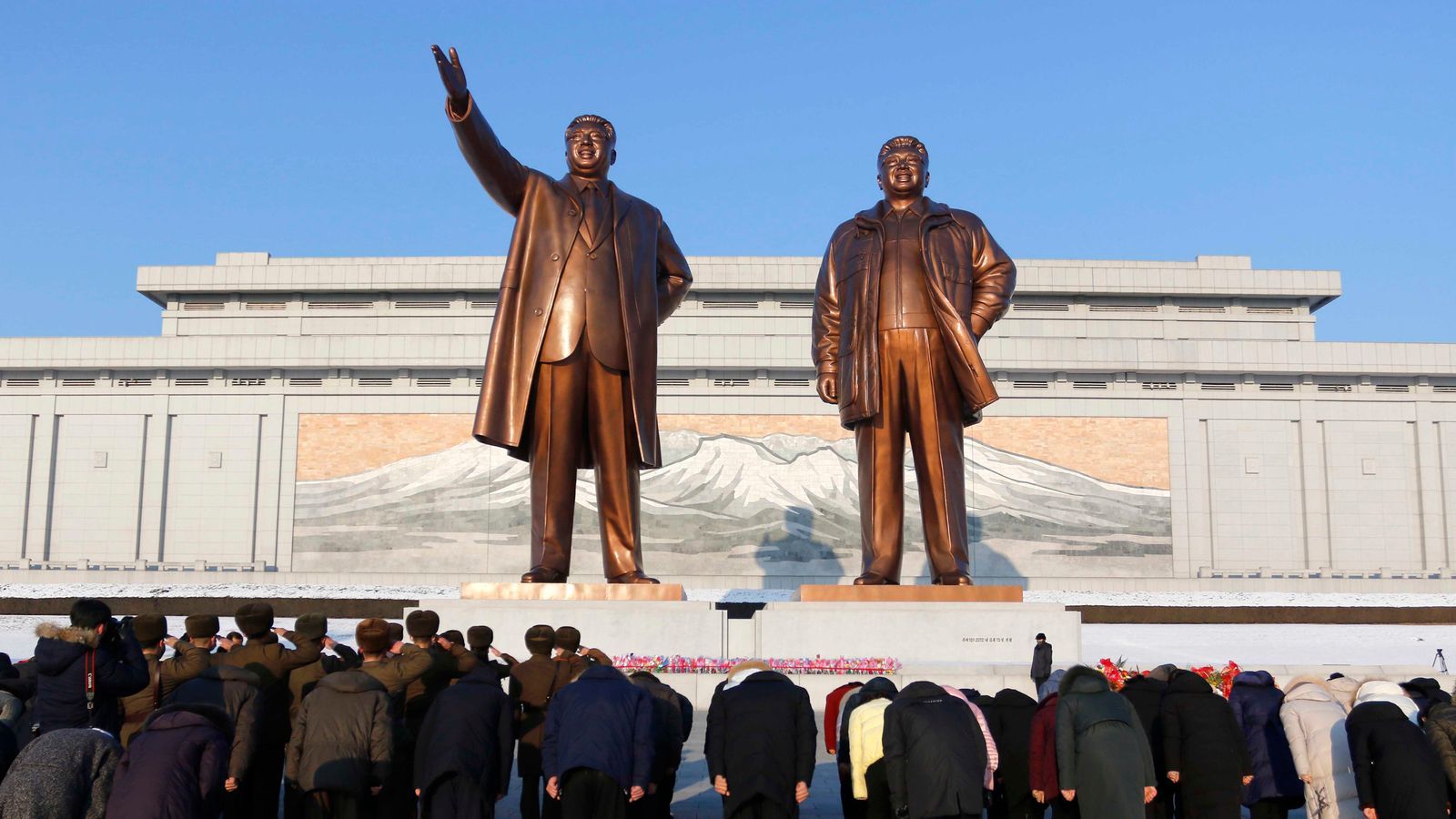
It was only when the conference was over, just before they were to leave for the airport, that Emms and the other attendees received their passports back.
"Just before leaving for the airport, and lot of people don't know this because I didn't sort of make it public, I was the only person, I was called up to my hotel room and I had my hotel room searched and I was interrogated by the guides.
"So this whole assumption or accusation that I was somehow some kind of friend of North Korea is just completely untrue. It was a very frightening experience."
Emms said he was not searched physically but "the whole room was turned upside down after I checked out and I was asked to go in. And then I'll always remember quite vividly the cleaners were outside with very sort of, you know, frowny faces if you like.
"And these guys were asking me questions about have you got anything in your room that you've concealed? Have you got anything like this? If you've been recording us, if you've been doing this, it was all those kinds of questions.
"So it was you know, I was sitting there really praying on the way back on the bus to the airport that I was gonna get stamped to get put on a plane which, thankfully, I did with no issues, but it was scary."
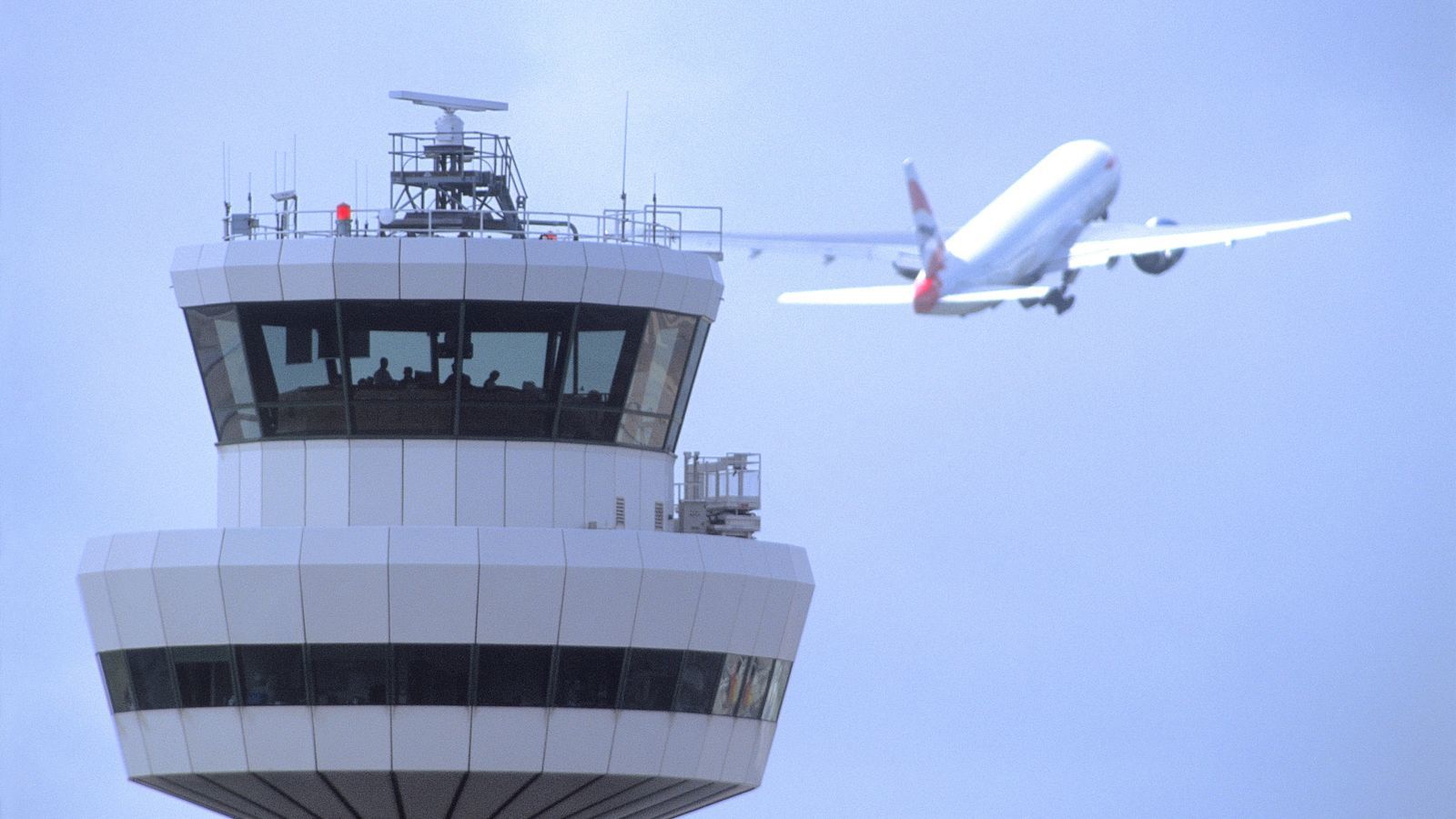
Interactions with British authorities
The indictment against Emms quotes a text message he sent to the group of attendees stating: "Hi all I just got pulled by police at the airport[.] Would recommend removing any photos of conference as they knew a lot."
He told Sky News he was "pulled at Gatwick Airport when I landed in the UK, having returned, and I was asked some very basic questions about what went on, which I complied with.
"As soon as I got home I felt so concerned about it that I actually called up the British intelligence helpline and said 'Look, if I can be of any assistance whatsoever, please get in contact with me. I didn't mean to do anything wrong, if I have done anything wrong, please let me know and let's sort it out.'
"And I didn't hear anything until after Virgil Griffith's arrest, in which I spent some time with UK authorities in Dubai, where I've been living for the last few years.
"At the end of the time that I spent with them, you know, they made it clear to me that they didn't feel that I'd done anything wrong and they weren't going to take the matter further. So I thought that's it, that's fine, we'll leave it there."
Emms told Sky News: "I'm not a supporter of North Korea, or their government or their nuclear weapons programme. In my view those embargoes and sanctions are there for a reason."
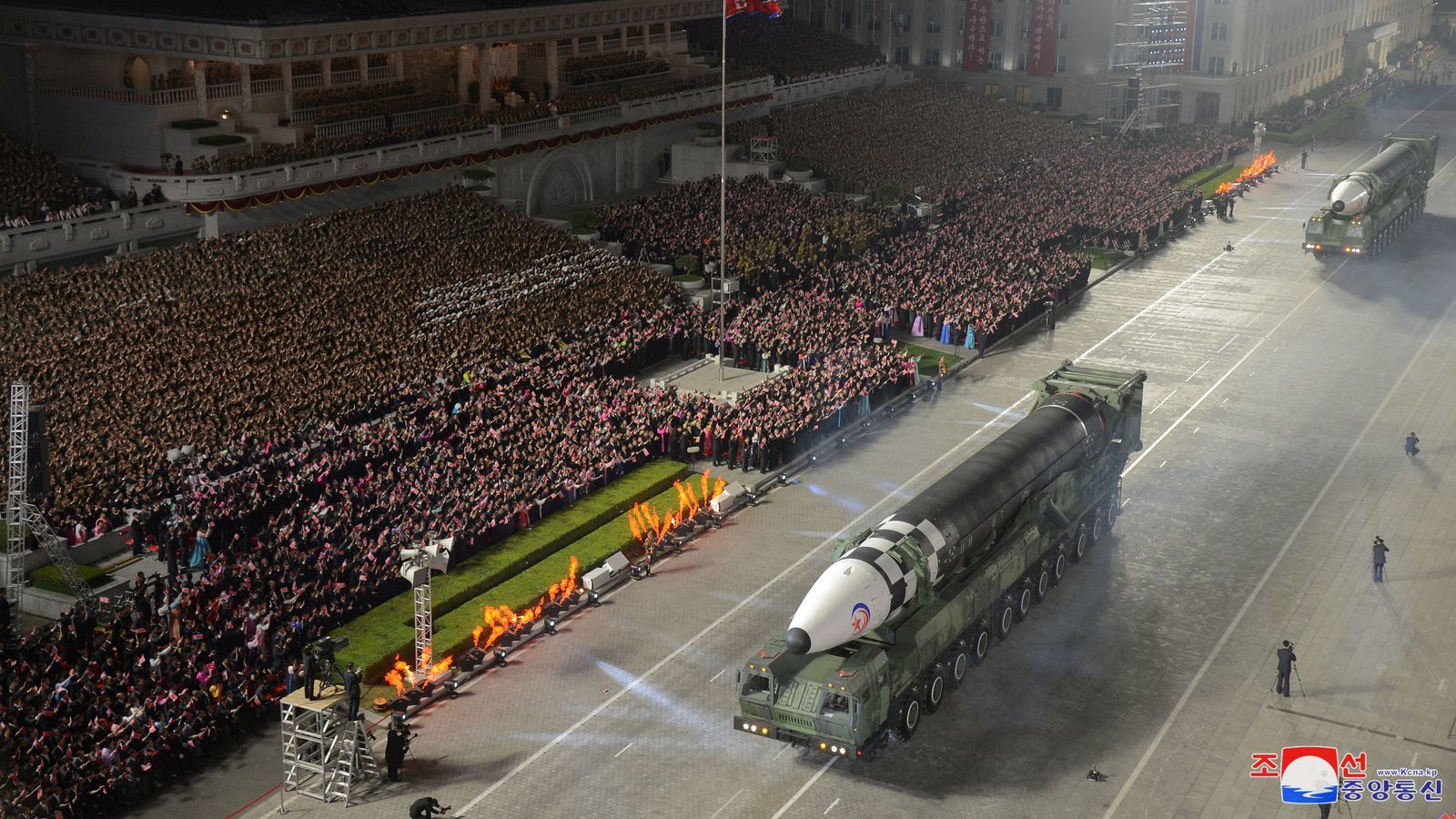
Arrested in Saudi Arabia
Emms had been invited to Riyadh in February for Saudi Arabia's LEAP conference. He went to the airport to fly back to Dubai very early in the morning. "I hadn't had my first coffee, so I was really looking forward to getting through to the lounge and having a coffee before my flight."
But as he went through passport control, his documents would not scan.
"I travel a lot so that didn't really surprise me," he said.
"Eventually, I was pulled to one side, taken into originally an ante-room at the immigration where the officers were going through reams and reams and reams of printout paper.
"They were really trying to figure out, I think, what was going on. And eventually they found something and they just looked at me and they said the word 'America'. I kind of looked at them and I went 'Oh, okay'.
"I was then arrested and taken to the police station inside the airport. And I sat down there for a number of hours while they made a decision as to what they were going to do with me."
Before his phone was confiscated - but when he knew he was going to be detained - Emms created a WhatsApp group "with all of my close family and my close friends, business partners, everyone", he said.
"I just went: 'Urgent. Read this. Detained in Saudi. I don't know what you can do'," he explained, "but, just, this is the situation and this is why I think I'm here. So that's what I did."
"And I also managed to call the British Embassy while I was there. I just literally picked up my phone. The guy was saying you can't call anyone. I just thought you know what, I'm going to ignore him. So I picked up my phone I called the British Embassy and said: 'I'm here just so you know'."
The duty officer at the embassy took his details but said there wasn't much they could do on a Sunday.
"Eventually I was called by a case officer who calls me once a week. She's absolutely brilliant. Unfortunately the big problem in this situation is, as I've been told and I've been written to on various occasions by the British government, they feel that their hands are tied and they can't get involved actively in this case."
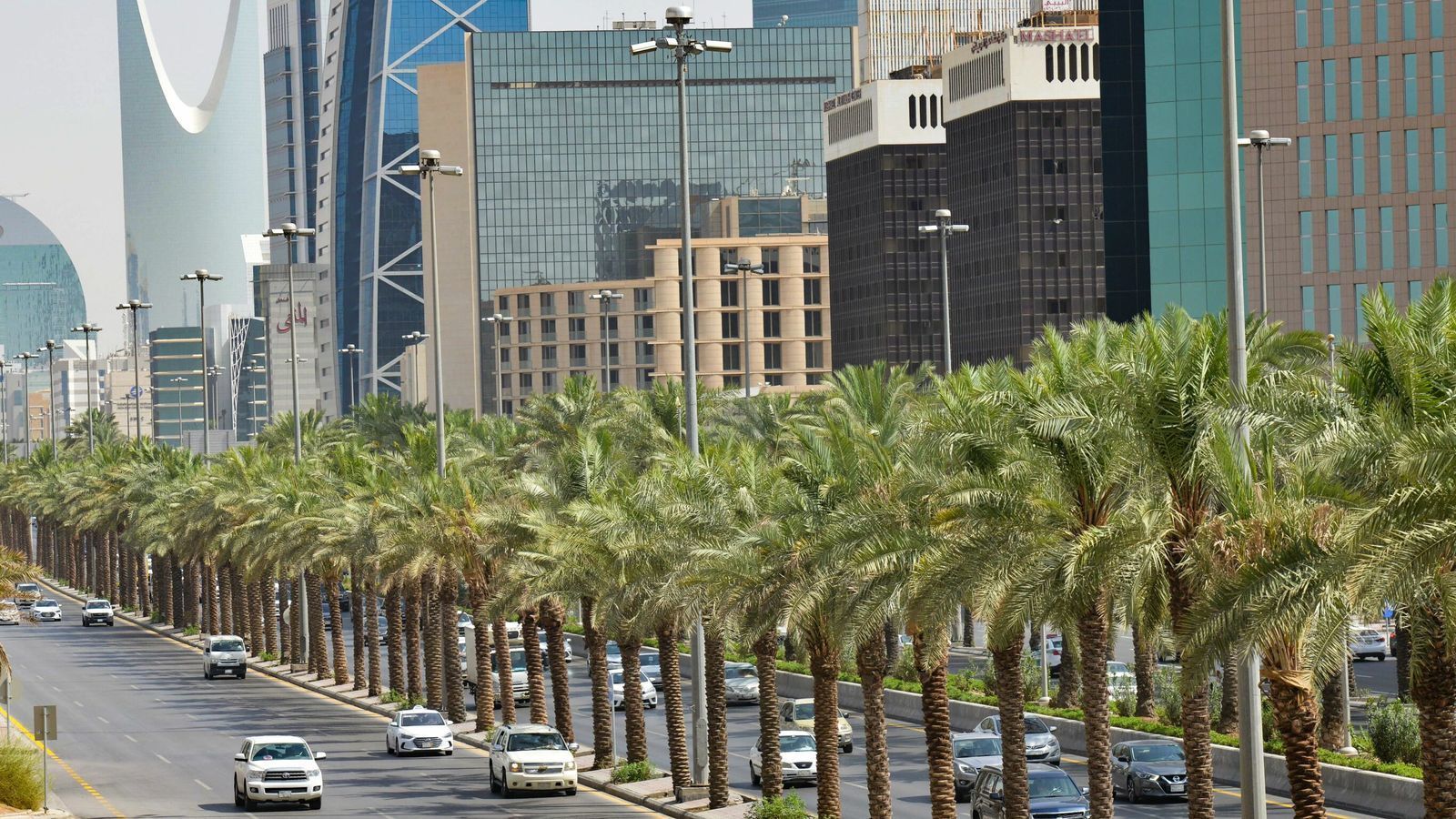
The kindness of prisoners
Emms said conditions in jails in the Middle East "tend to be a little more severe than you'd experience let's say in the UK. The sanitary conditions are passable but not the best and you tend to have a lot of people in very small cells, most of them you know... there's no sort of bed, most of it is mats and mattresses on the floor. And there's a lot of people in a very confined space."
He said the people in the airport jail were "incredibly kind" to him. "As soon as I got there, they actually gave me some of their supply of water, gave me food, really tried to keep my spirits up. They were really lovely.
"It was a real eye opener for me. When you're in there, you realise there's a lot of injustice in this world. And there was one guy in there who had been in there for a couple of years. And essentially, he'd been there for a couple of years because the country that was requesting his extradition had not simply picked him up.
"Obviously I wouldn't know what crimes they had committed. Once you're in prison, so I'm told, you don't discuss what anyone's done. But they, on the face of it, were incredibly kind."
The second prison was "a little more scary" he said. "It wasn't like the experience in North Korea - you know, you're not sat in a cell so your body reacts in a different way - whereas when you're in confinement like that, at least in my experience, I was just in a survival mode.
"There wasn't really a sense of fear. It was just a sense of got to get through this, got to get out."
Eventually the Saudi Arabian authorities found a prosecutor that spoke English. He outlined to Emms what was going on.
"He asked me a very simple question. He said: 'You've got a choice here. You can either be extradited of your own free will or you can decline the extradition request, in which case the Saudi authorities will decide whether you're going or not. What do you want to do?'
"My instant reaction, and most people's would be, was: 'I decline going of my own free will.'
"So I was then taken back to the other police station in the airport. And then fortunately, you know, again, the officers looking after us in the prison were very kind to me, and they managed to post me bail that day."
Being released was a weird feeling: "Your body's still having come down from you know, I guess all the adrenaline and everything that's moving around inside you.
"The first thing I did is I went on, you know, my app on my phone, I booked the nearest hotel to the airport, didn't even look at the price, I was like I just need to get to a bed."
But he couldn't sleep. "I was lying there in bed, trying to sleep, but my body just wasn't having any of it.
"And it took a while really, I guess for all of the, you know, everything, to leave my body. All of this, this whatever was going on inside me, that I could actually sleep.
"At that point I slept for 12 hours straight without waking up, but I'd been up probably for a few days by then."
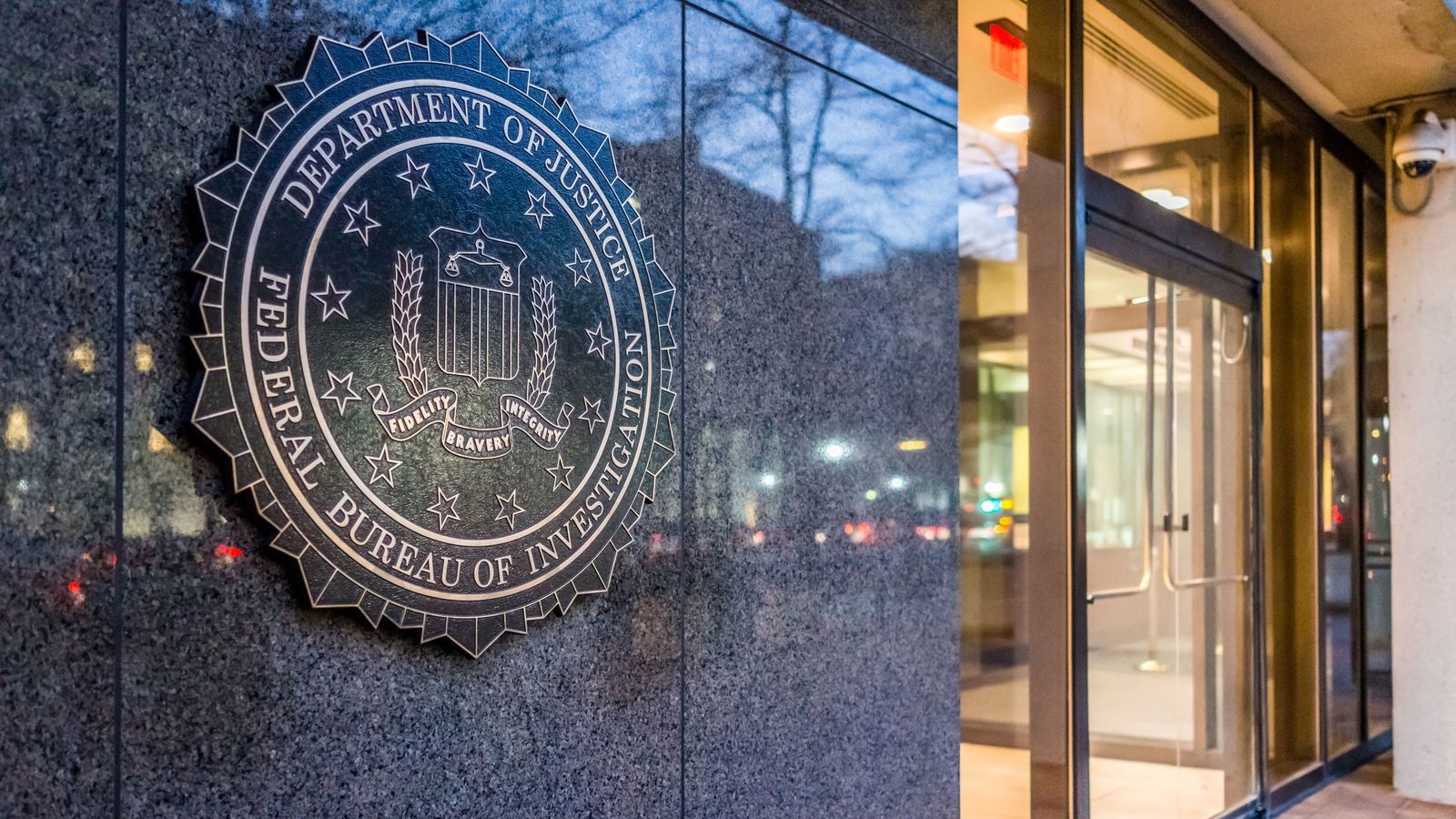
Hurt more than angry at the injustice
That was in February and by 25 April, when the indictment against him and Cao de Benos was unsealed, Emms said he had already spent most of his life savings on legal fees. "We're talking close to seven figures," he said.
After the indictment was unsealed, his bank accounts were frozen and a week later the FBI released a wanted poster for him, describing him as an international flight risk and describing his whereabouts as "known to be in Saudi Arabia in or about March of 2022".
"They know exactly where I am because they were informed by the Saudi government that I had been detained by the Saudi government awaiting documentation from them so that they can judge the [extradition] case," said Emms.
"I've been held in Saudi Arabia for the last five months with no evidence being supplied from the US government as to what I'm guilty of.
"Under any other extradition treaty that I'm aware of - bear in mind there isn't one here in Saudi with the US, which has actually created the problem - the US government would have a specific number of weeks to respond and provide that evidence. They haven't done it.
"I believe in the UK [the time to submit evidence] is no longer than than a month. Here, you know, we're five months and counting into this and there's still not been a shred of evidence or a shred of official paperwork supplied.
"I've applied now to the United Nations court against arbitrary detention," he said, explaining he felt hurt more than angry at the injustice of his situation.
"I'm not asking to, you know, run away and hide. What I'm asking for is to be allowed to return to the UK to actually go through the extradition process and go through British law to have a British judge, you know, judge whether I should be sent to the US or not.
"I'm not trying to run away from this. I'm trying to be open but I can't at the moment, I'm living in pretty bad conditions here in cheap hotels.
"The US government froze all my bank accounts. So I'm really relying on the mercy and the grace of friends and family to make sure that I can pay my day-to-day expenses.
"And I really just want to come back home and deal with this, deal through the British court system, which I don't think is a huge thing to ask, even of the Americans."
Sky News has requested a response from the Department of Justice about Emms' complaints.











